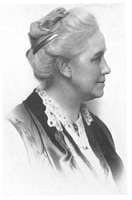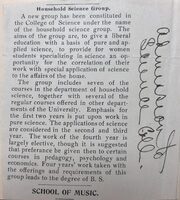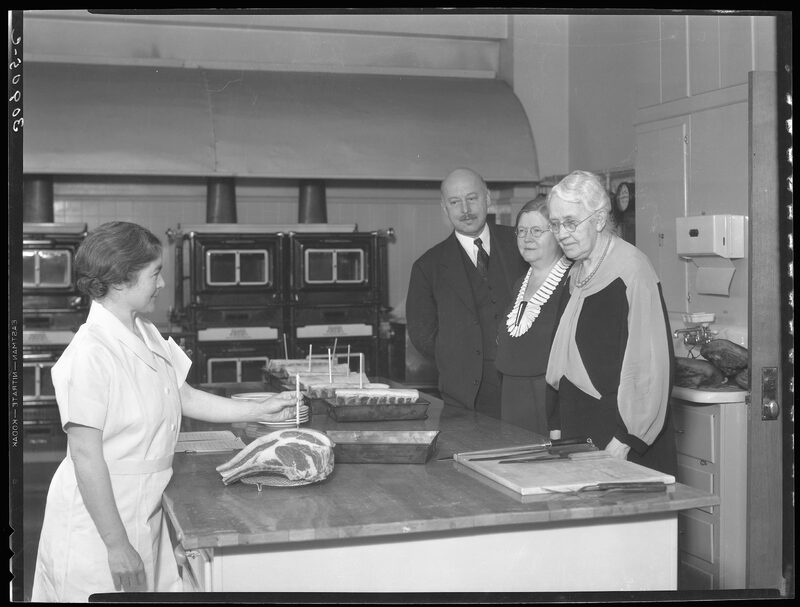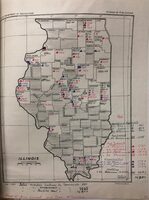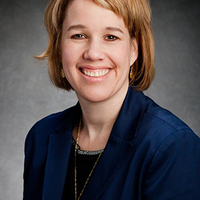December 2020 - Dr. Zeynep Madak-Erdogan
Dr. Zeynep Madak-Erdogan is an Associate Professor of Nutrition in the Department of Food Science and Human Nutrition and the Division of Nutritional Studies. Her research investigates the ways that nutrition influences the effects of estrogens on women's health, particularly for post-menopausal women and breast cancer survivors. Dr. Madak-Erdogan is affiliated with the Center for Digital Agriculture, the Carl R. Woese Institute for Genomic Biology, the Beckman Institute for Advanced Science and Technology, the National Center for Supercomputing Applications (NCSA), and the Cancer Center at Illinois. She also directs the Women's Health and Nutrition lab on campus.
From the University Archives
The University of Illinois has had a strong nutrition program for over a century, and it has long been connected with the innovations of women scientists on campus. Dr. Isabel Bevier, head of the Household Sciences (later Home Economics) department on campus from 1900-1921 worked to establish a rigorous, science-based college education for women in order to prepare them for successful careers as teachers, dieticians, housekeepers, or housewives.
The Home Economics Movement began in the last decades of the 19th century, as more universities across the United States began to admit women. At the same time, more universities, especially in the Midwest, began promoting "practical" education in areas such as agriculture and engineering, rather than only in Latin and Greek classics. Home Economics, therefore, arose as a discipline in order to provide "a field of applied science" that corresponded to the opportunities available to women at the time. As Isabel Bevier put it while writing to a colleague in 1911, “most women have to settle the questions of food, clothing and shelter ... so they need all the help they can get from science, literature, art, mathematics and economics, as well as technical skill.” (University Archives, Record Series 8/11/20) An applied education would be valuable to women students regardless of what they pursued after graduation.
Isabel Bevier trained as a teacher at the University of Wooster in her home state of Ohio and taught natural sciences at several colleges while taking summer courses in chemistry at several institutions, including Harvard and MIT. In 1900, the University of Illinois at Urbana-Champaign hired her to resuscitate the household sciences department, which had closed after the previous instructor married the University's regent.
Due to Professor Bevier's background in chemistry, she believed in the importance of science education for her students. Frequently, she protested the assumption that Household Sciences was nothing more than cooking and sewing classes; although she admitted that may be true at other universities, she was proud of the scientific basis of her department. Bevier pursued a variety of scientific innovations herself in order to understand how to more safely and efficiently cook food. For example, she was the first to use a thermometer to test whether meat was fully cooked. Additionally, she developed labs and other ways for her students to apply the science they learned in the classroom. The University of Illinois' Bevier Café has its roots as a cafeteria laboratory that Household Sciences students worked at in order to learn how to properly prepare food and manage a lunch room.
In 1914, Congress passed the Smith-Lever Act, which created extension services at agricultural schools like the University of Illinois in order to reach more people who may not enroll in traditional courses. Isabel Bevier saw this as an opportunity to help the wives of farmers and students, as well as other women across the state of Illinois, to learn principles of nutrition. She developed "movable schools" that taught Household Science classes to women in cities and rural areas all over the state of Illinois. This extension work became particularly critical during and after World War I: rising costs of meat and butter necessitated creativity in cooking, and more women needed to take on additional labor at home, at work, or with volunteer organizations to support the war effort. In 1919, over 100,000 people attended extension lectures, demonstrations, home visits, or trainings.
Isabel Bevier's work as the head of the Household Sciences department provided the foundation for the Food Science and Nutrition department at the University of Illinois at Urbana-Champaign today. Her emphasis on the importance of applied science made education accessible and practical for a wide variety of women across the state of Illinois, and she represents the start of a long tradition of women in science at the University of Illinois.
Sources and Further Reading:
Isabel Bevier Papers, Record Series 8/11/20
Bevier, Isabel, 1860-1942, and Susannah Usher. The Home Economics Movement. Boston: Whitcomb and Barrows, 1906. Link
Bartow, Beverly. "Isabel Bevier at the University of Illinois and the Home Economics Movement." Journal of the Illinois State Historical Society (1908-1984) 72, no. 1 (1979): 21-38. Link

